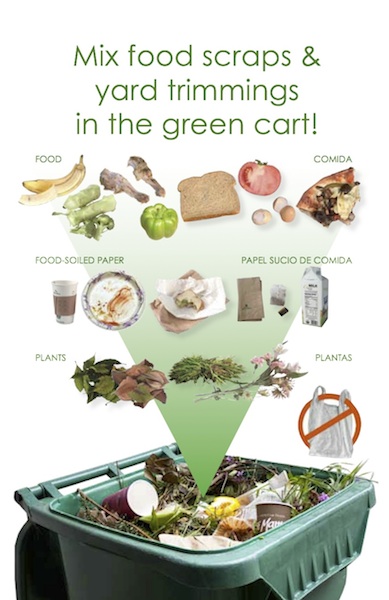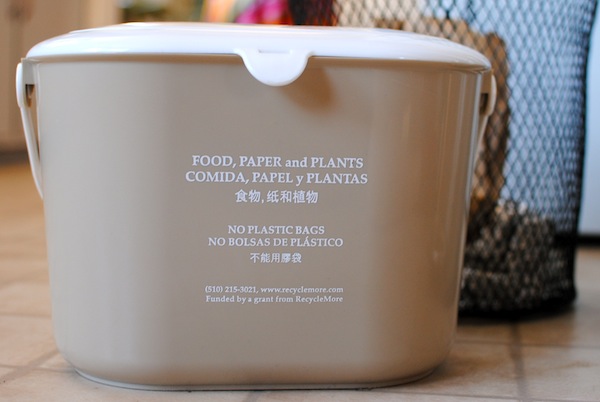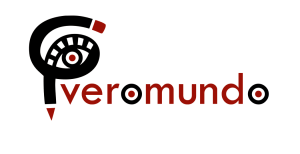More than a hundred Richmond residents were happy to get a free food scrap pail during the Juneteenth event on June 19th at Nichol Park. The environmental staff from the Manager’s department of the city was handing out pails to promote its new food scrap collection program that makes it possible for residents to mix food leftovers and yard trimmings to be composted.
“I can’t wait,” said Victoria Weatherbee, a Richmond resident, to a neighbor about being able to start composting.
The city of Richmond is moving forward with two initiatives for composting beginning on July 1. Starting then, styrofoam and plastic food to-go containers are no longer going to be used for food prepared in Richmond. All food providers including restaurants, mobile food vendors, delis, gas stations, nonprofit organizations, public events, and city facilities will be required to give away compostable food containers, including tableware such as spoons, forks and knives. The exceptions are straws and lids.
Additionally, residents will be able to have food scraps and other compostable items picked up from their homes for transport to a composting facility.
The food scrap collection program
Residents of Richmond currently divide their refuse between three waste carts that they leave on the curb for pickup. The brown cart holds regular garbage, the blue is for recyclables and the green is for yard waste.

Starting this Thursday, the rules have changed for the green cart. While residents can still use it to dispose of yard waste such as twigs, flowers, grass and yard trimmings, now residents may also put food wastes and compostable items into it. Accepted items include fruit, vegetables, bread, pasta, meat, bones, dairy products, eggshells, and coffee grounds. Additionally, biodegradable materials such as coffee cups, paper plates, paper bags, napkins, tea bags and milk cartons may be added to the green cart.
People who compost in their own backyards are often advised to not put meat, bones, dairy products or seeds in their compost, it is fine to put those types of food scraps in the green bin, because it will go to a composting facility that will break it down into soil faster than a home backyard composting bin.
“You can put anything in the green cart that was alive at one point in time. Anything that is from a plant, tree or animal that can decompose,” said Adam Lenz, Sustainability Coordinator for the city of Richmond. Lenz said that the city’s goal is for residents to put as much accepted material into the green bins as possible.
According to Lenz, the amount of compostable material a household produces depends on the lifestyle of its residents. A resident could divert up to 40 or 50 percent of the waste that goes into their trashcan by using the green cart and could therefore save on their garbage bill. Lenz said that 80 percent of West Contra Costa County residents have a 35-gallon trash cart — if they are able to transition to putting their food scraps to the green cart, they might be able to use a 20-gallon mini can instead and pay less monthly. Click here to see the payment options depending of the size of the cart.

In between pickup days, residents can collect items to be placed in the green curbside cart using the free food scrap pails that the city is giving out. These plastic bins allow food scraps and food-soiled paper to be stored in a resident’s kitchen before being added to the green cart on trash day. Food scraps wrapped in newspaper or a paper bag can also be added to the green cart, but plastic bags will not be accepted.
Food scrap pails have been handed out at different public events and will continue to be given away during events at City Hall during which the environmental staff will talk about the program. Starting in mid-July, residents can come to City Hall anytime to pick up the bins. For more information call (510) 412-2096 or click here.
Recyclables vs. Compostables
The blue cart is still to be used for the materials that the Richmond Sanitary Service, the company that provides waste management services to the city, is able to recycle. These include aluminum cans, foil pans, plastic narrow neck bottles, milk and water jugs, water, soda, and juice bottles and clean paper and cardboard materials.
Compostable materials such as food-soiled, waxed or dirty paper, and paper bags, containers, cups are not acceptable in the blue cart, but now they can be placed in the green cart.
A lot of to-go containers offered by food providers include plastic cups, tubs and clamshell containers. The Richmond Sanitary Service does not recycle those. The only plastics that are recyclable in Richmond are narrow neck bottles, which means that the mouth is smaller than the body. (Laundry detergent bottles are a good example.)
The composted soil
Once the program is up and running, the City Manager’s office plans to have compost giveaways for the community, so that people can use this soil in their backyard and in community gardens. “We are excited to bring it back to the community, because when people get it back that is truly connecting the loop and getting the people excited about filling up the green bin with the best materials,” said Lenz.
According to Lenz, much of the composted soil will also be sold to farms and vineyards in California that will use it instead of synthetic fertilizers and materials. “Vineyards notice that they can decrease their water consumption by 50 percent after using compost for three years, because of all the microbes,” he said.
Richmond’s new composting program received a grant to fund outreach materials and kitchen sink pails from Recycle More, which is a joint powers agency that operates as the Waste Management Authority in West Contra Costa. San Francisco, Berkeley, Oakland, and Alameda have similar composting programs. The neighboring city of El Cerrito will start the same program this Thursday together with Richmond, and the city of San Pablo will join on October 1. “I’m really excited that they are on board for this fall. By a having a regional approach, it is going to make it easier for the West County community to move forward with the composting program,” said Lenz.
The food scrap collection program is meant for city residents only and it’s voluntary. According to Lenz, the City Manager’s office is planning to introduce the voluntary program to residents first, and then hopes to expand the program to commercial accounts in 2011 and give them technical assistance. The city may later consider drafting a mandatory resolution as part as a long term goal. Last year, San Francisco became the first city in California to require mandatory composting recycling.
To raise awareness of the new program, the city is leaving informative cards hagers on the green cart, adding inserts to garbage bills, and has mailed a bilingual postcard with information about the composting program. The city is planning future events to educate people about how the program works. Residents with questions about the program can call (510) 412-2096 to speak to city staff. To order a free green curbside cart you can go to the Richmond Sanitary Service website or call (510) 262-7100.
June 28, 2010 Richmond Confidential

